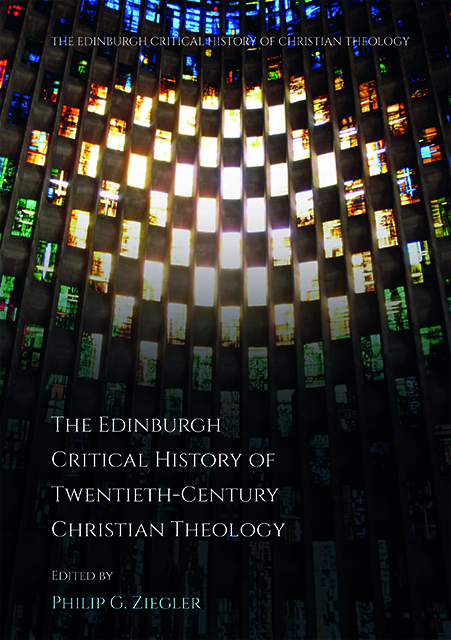Book contents
- Frontmatter
- List of Contents
- Notes on Contributors
- Editor's Introduction
- 1 Modern Theology in a Scientific, Historical Age
- 2 Tradition and Innovation
- 3 Scripture and Criticism
- 4 Reason, Method, System
- 5 Catholicism and Ecumenism
- 6 Fundamentalism and Evangelicalism
- 7 Synagogue, Sho’ah and State
- 8 Religion(s)
- 9 God
- 10 Spirit
- 11 Christ
- 12 Liberation and Freedom
- 13 The Secular – The Political: Augustine and Political Augustinianism in Twentieth-Century Political Theology
- 14 Globalisation after Empires: World Christianity and the Theological De-centring of Europe
- 15 War and Peace
- 16 Race and Black Theology
- 17 Sex and Gender
- 18 Hope
- Index
13 - The Secular – The Political: Augustine and Political Augustinianism in Twentieth-Century Political Theology
Published online by Cambridge University Press: 14 July 2023
- Frontmatter
- List of Contents
- Notes on Contributors
- Editor's Introduction
- 1 Modern Theology in a Scientific, Historical Age
- 2 Tradition and Innovation
- 3 Scripture and Criticism
- 4 Reason, Method, System
- 5 Catholicism and Ecumenism
- 6 Fundamentalism and Evangelicalism
- 7 Synagogue, Sho’ah and State
- 8 Religion(s)
- 9 God
- 10 Spirit
- 11 Christ
- 12 Liberation and Freedom
- 13 The Secular – The Political: Augustine and Political Augustinianism in Twentieth-Century Political Theology
- 14 Globalisation after Empires: World Christianity and the Theological De-centring of Europe
- 15 War and Peace
- 16 Race and Black Theology
- 17 Sex and Gender
- 18 Hope
- Index
Summary
The premise of this essay is that rereadings of Augustine and Augustinianisms are crucial for interpreting twentieth- (and twenty-first-)century Christian political theology. I begin with the debate between Carl Schmitt and Erik Peterson, contextualising it not only in relation to their differing ecclesial responses to modern secularism but also in response to Henri de Lubac's important account of ecclesiology in Corpus Mysticum, which also influenced in various ways the political-theological narratives of Ernst Kantorowicz, Sheldon Wolin, John Milbank and Charles Taylor. My constructive proposal – offered over against not only earlier forms of Christian realist Augustinianism such as Reinhold Niebuhr1 and Robert A. Markus, but also more recent forms of liberal political Augustinianism such as Oliver O’Donovan, Robert Dodaro and Eric Gregory – will be to argue that a more ‘apocalyptic’ or figural reading of Augustine's two cities and their relation to ecclesiology and politics of the saeculum (in conversation with the work of Ivan Illich) facilitates another trajectory of interpretation that I identify as ‘messianic’ political theology. Such a position is less dualistic with regard to Church and state and more amenable to an expansion of the sphere of ‘the political’ to include economy, technology and household in ways that illuminate the lived complexity of theological claims in a secular age.
Augustine and Augustinianism is crucial for our topic, and not only because Augustine bequeathed to the West and its entire history of theological politics and political theology the centrality of the saeculum (spawning a vast range of interpretations of its meaning).3 In the twentieth century there has been a veritable explosion of interest in ‘political Augustinianism’ that often quite directly engages the fraught relations in contemporary politics between the secular pluralism of religions and theologically committed critiques of political regimes, policies and institutions in both theoretical and practical terms. What is often overlooked, however, is the Augustinian debate at the heart of ‘political theology’ – a discourse made current in the twentieth century by the juridical theorist Carl Schmitt that has also become increasingly contested in recent times around the meaning of secularisation and secularism in liberal modernity. This is a discourse that has far exceeded earlier ‘critics of modernity’ such as Schmitt and less controversial philosophers such as Hannah Arendt and Eric Voegelin, to include the counter-Enlightenment critiques of a range of thinkers who identify as postmodern and postsecular.
- Type
- Chapter
- Information
- Publisher: Edinburgh University PressPrint publication year: 2022



